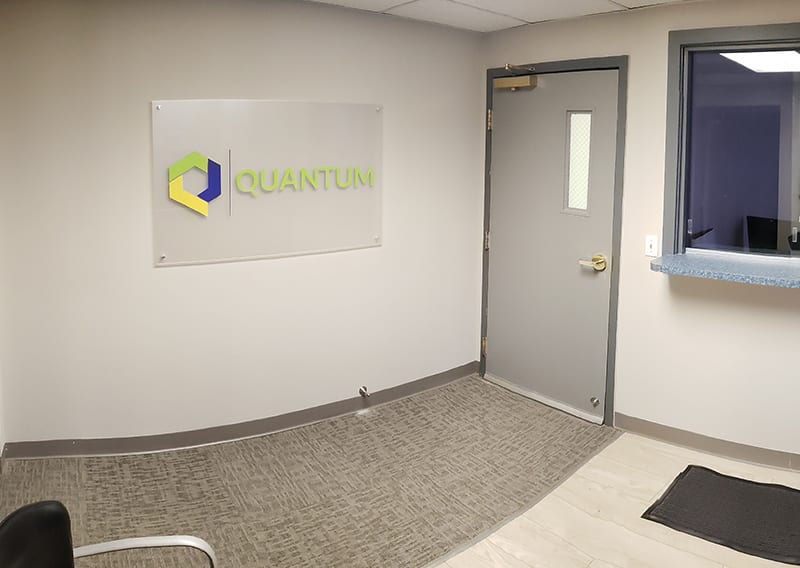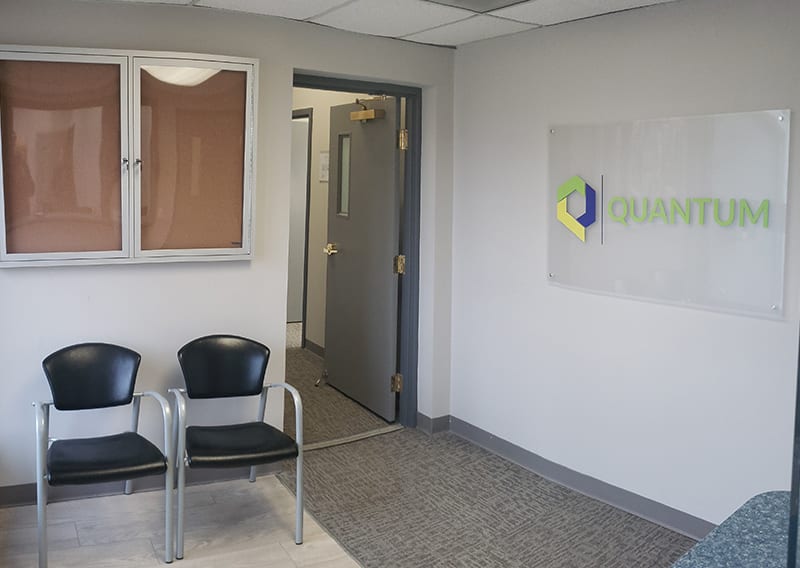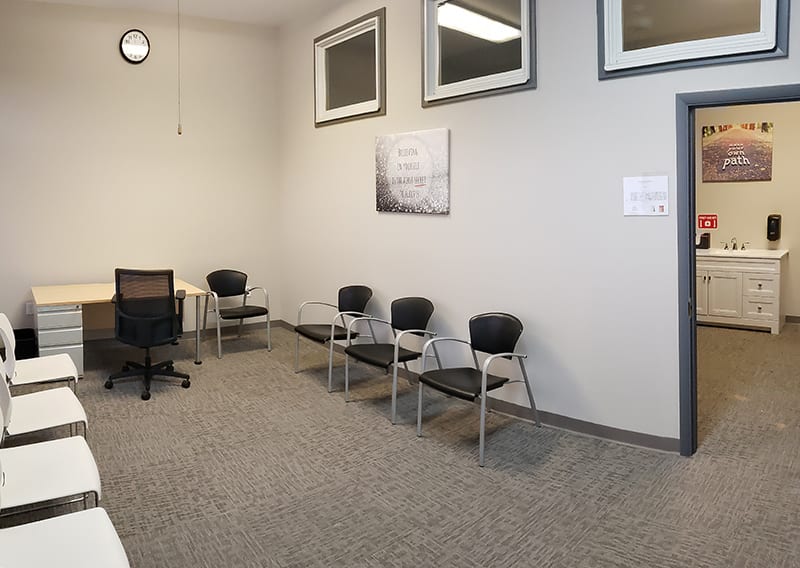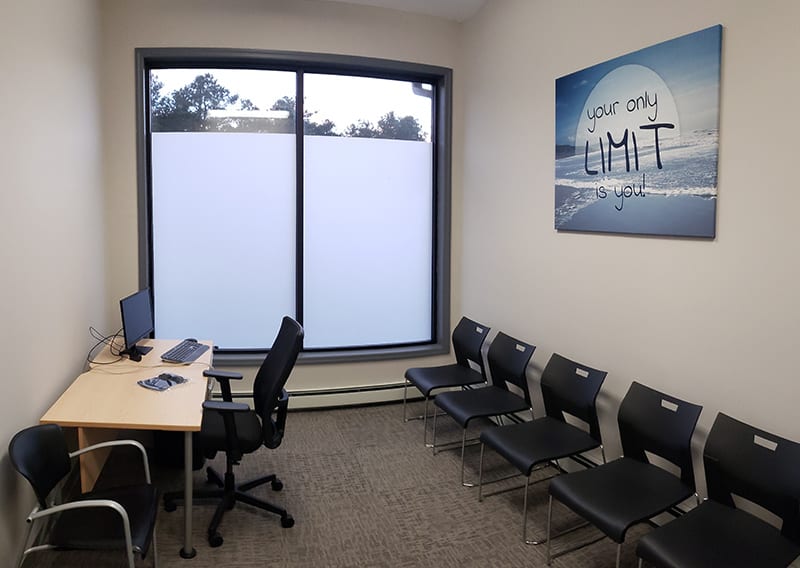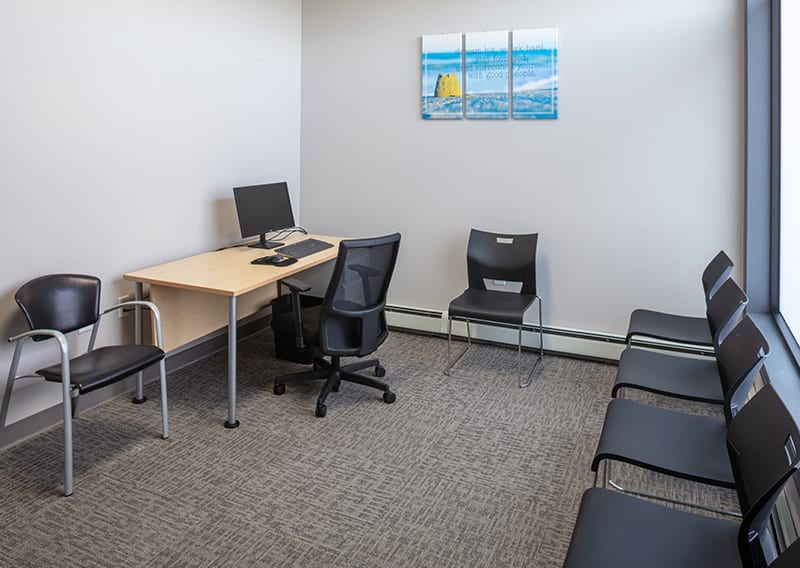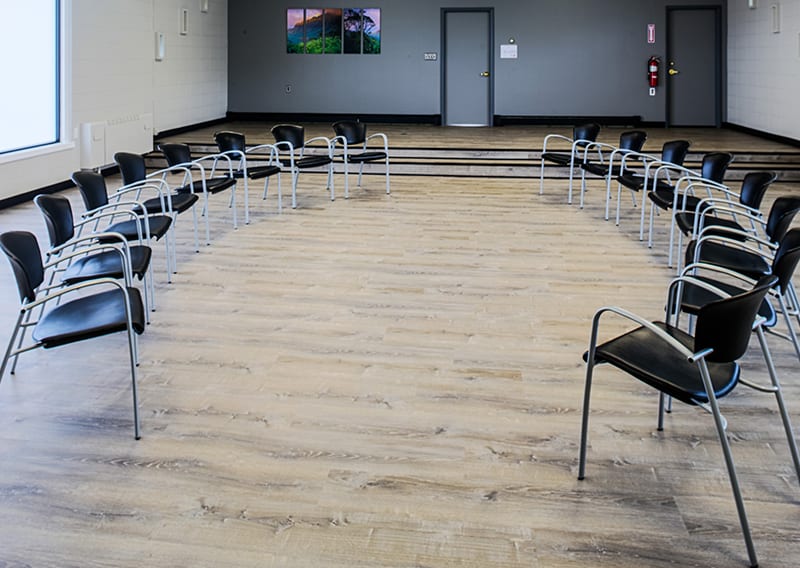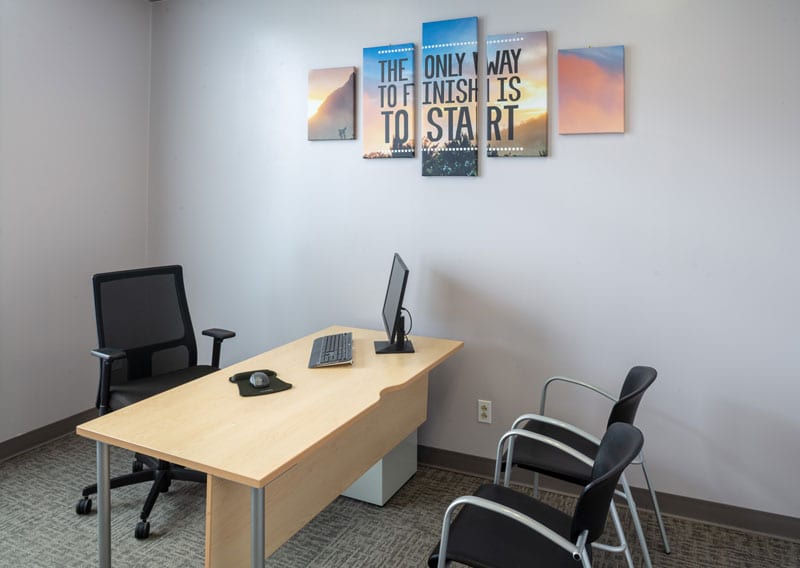Rehab Near Me: Best Detox & Rehab Center For Addiction in Edison
Quantum Behavioral Health is the top choice for Edison residents that are ready to embark on their journey of addiction recovery. Our team is dedicated to your success with addiction treatment and sees each patient as the individual that you are outside of just your substance use disorder. Drug and alcohol addiction can occur to anyone and our team will treat you with the dignity and respect that you deserve throughout your recovery program. Healing within our recovery center will provide you with individualized support and varying levels of care that will meet you where you are in your healing process. Patients are offered a comprehensive treatment plan that incorporates a variety of evidence-based therapy methods that will support them in healing from their drug or alcohol addiction physically, emotionally, mentally, and spiritually. Whether you need support from an inpatient detox program, inpatient rehab, outpatient treatment programs, or aftercare programs, Quantum Behavioral Health has a treatment program that will enable you to have long-term success in sober living.
Photo Gallery
Click photos to enlarge
Are You Ready to Begin Your Journey to Recovery?
You could be completely covered. Verify Your Insurance Today.
The Quantum
Process Outpatient Rehab NJ
1. Make the Call
Contact our Quantum Team at
(609) 993 – 0733 to get started.
2. Complete
Your Intake
This streamlined process includes a series of questions and discussion of your unique needs and goals.
3. Get the Best Care Team Possible
After your intake, you’ll meet your Care Team, a group of amazing professionals dedicated to helping you make recovery reality.
4. On-Going Support
After you meet your Care Team, you’ll start to receive treatment based on a Care Plan that’s designed to help you achieve and sustain your recovery.
- Why Choose Quantum Behavioral Health
- Highest Rated Alcohol Detox Program
- Drug Detox Program
- Top Alcohol Rehab in Edison
- Drug Rehab in Edison
- How Much Does Rehab Cost in Edison?
- How Long Is Detox?
- How Long Is Rehab?
- 30 Day (Short-Term Rehab)
- Long Term Rehab (60-90 Days)
- Additional Therapies & Addiction Treatments Available:
- Does My Insurance Have Coverage For Rehab?
- MAT
- Cognitive Behavioral Therapy (CBT)
- Dialectical Behavioral Therapy (DBT)
- Rational Emotive Behavioral Therapy (REBT)
- Dual Diagnosis Treatment
- EMDR
- Relapse Prevention
- Life Skills Training
- Vocational Training
- Group Therapy
- Experiential Therapy
- One on One Therapy
- Family Therapy
- Trauma Informed Therapy (After PTSD)
- Physical Fitness
- Off Site Activities
- Holistic Addiction Treatment in Edison
- Anxiety Disorder
- Bipolar Disorder
- Borderline Personality Disorder (BPD)
- Codependency
- Depression
- Impulse Control Disorder
- Post-Traumatic Stress Disorder
- Alcohol & Drug Rehab for Active Military Members & Veterans
- Stresses Of Military Life for Active Service & Family Members
- Specialized Addiction Treatment for Military Service Members & Veterans
- PTSD
- Mental Health Services for Military Members & Veterans
- Why Choose Quantum Behavioral Health for Detox & Rehab in Edison
Why Choose Quantum Behavioral Health
Edison residents want to find a treatment program that honors and respects the diverse healing needs of each patient. Each substance abuser has a personal history of substance abuse including specific underlying causes for addiction that are rooted in their circumstances and emotions. That is why we pride ourselves in offering treatment programs that are specifically designed with the patient’s unique healing needs in mind. Our team will get to know you and your story to develop a long
Highest Rated Alcohol Detox Program
Alcohol is a highly addictive substance that can create strong physical dependency within its users. The longer you engage in alcohol abuse, the more your body becomes reliant on alcohol to be able to function throughout the day. As you prepare to start your recovery journey, the first initial step is to remove the harmful toxins of alcohol through an alcohol detox program. Patients within an alcohol detox program will be monitored by medical professionals that will provide them with appropriate medical treatments that will help to reduce the onset of withdrawal symptoms and avoid serious or life-threatening side effects. Patients may be offered support of medication-assisted treatment programs that will offer FDA-approved medications that are designed to minimize the onset of severe symptoms and reduce the presence of strong alcohol cravings.
Drug Detox Program
Your drug detox program will be unique to you and your circumstances and history of drug abuse. Depending on which type of drug you are engaging in, you will experience a variety of withdrawal symptoms that will range in levels of severity. Drug withdrawal symptoms will often create side effects on your physical and mental health that will require medical treatment and behavioral therapy that will effectively heal your symptoms while maintaining your safety and comfort.
Top Alcohol Rehab in Edison
After you have rid your body of the effects of alcohol and overcome the initial alcohol withdrawal symptoms, you will have stability in your physical health to begin to look into the root causes of your alcohol addiction within an alcohol rehab program. Before beginning your alcohol rehab program, you will sit down with one of our addiction therapists and case manager that will work with you to identify and establish your goals for addiction recovery. Once we gain a clear understanding of your specific needs from a treatment program, we will create a treatment plan that is personalized to meet your specific needs. Your time in alcohol rehab will consist of a structured daily routine that incorporates individual therapy, group therapy processes, and engaging in holistic treatment methods that will support you in healing from your alcohol addiction within your mind, body, and spirit.
Drug Rehab in Edison
During your drug rehab program, you will be supported by addiction therapists along with your case manager that will create a specific treatment plan that is centered around your individual needs and goals for recovery. With the support of leading evidence-based therapy methods, patients will look within to what has been fueling their drug addiction all along such as emotions and traumas that have negatively impacted their addictive behaviors. As you progress through your rehab program, you will be able to heal from your underlying emotions and traumas while establishing healthy coping skills and tools for relapse prevention and long-term sobriety. Patients will be provided with support in developing and practicing coping skills and tools for relapse prevention including healthy emotional regulation methods, calming exercises such as breathwork therapy, conflict or trigger management, and developing a positive support system that will assist them in achieving and maintaining your overarching goals for sober living.
How Much Does Rehab Cost in Edison?
Choosing to address your drug or alcohol addiction within an addiction treatment program is a commendable choice to make. The team within Quantum Behavioral Health wants to honor your decision to get help by providing you with a rehab program that will work within your current budget. Patients’ treatment plans will be based on the levels of care needed and any additional support that they may need such as medication-assisted treatment. No matter what the cost of your treatment program, you will be provided with options for payment plans if needed to help you get started on your recovery process when you are ready to do so.
How Long Is Detox?
Your time in drug or alcohol detox will depend on your unique history of drug or alcohol abuse. For patients that have been engaging in substance abuse for a prolonged period, take substances frequently, or need to take an increased amount of drugs and alcohol, your length of time in detox will typically be longer. During detox, individuals will usually begin to feel the initial withdrawal symptoms within 8-10 hours after they last engaged in substance abuse. Once patients are in detox for 2-3 days, withdrawal symptoms will often peak at the most severe symptoms. Once you have reached the peak of your withdrawal symptoms, you will typically begin to experience a reduction in the severity of your symptoms and begin to restore your physical and emotional health. Detox will often last for 7-10 days depending on your individual history of substance abuse.
How Long Is Rehab?
Each patient that enters into rehab will have their own specific needs for healing and addiction treatment. You must allow yourself to take the time you need to undergo addiction treatment for optimal healing and results. As each person is different and requires different levels of care, patients will have the option of participating in drug or alcohol rehab for a period of 30, 60, or 90 days.
30 Day (Short-Term Rehab)
A short-term rehab stay of 30 days allows Edison residents to have a fresh start toward life in addiction recovery by removing themselves from the environment that contributed to their addictive behaviors. Patients will be able to reside within the safe and supportive environment of our recovery center which will allow them to live within a center that is focused on addiction recovery, health, and wellness. 30 days is the minimum amount of time that you can engage in addiction treatment. This length of time will allow you to begin specific evidence-based therapy where you will start your healing process while developing the tools to establish a new way of life on your road to recovery.
Long Term Rehab (60-90 Days)
A long-term rehab program of 60 or 90 days is available to Edison residents that feel the need to take their time to fully engage in addiction treatment methods. Long-term rehab offers patients the opportunity to engage in your personalized treatment plan along with specialized treatment methods including trauma therapy or dual diagnosis treatment. These healing methods will support you in healing from the root causes of your substance abuse and removing the negative responses and memories of deep seeded emotions or traumas that have influenced your everyday life. A long-term rehab program is recommended for patients that have a history of relapse. Patients will be able to explore their triggers and how they can strengthen their coping skills and develop a strong relapse prevention plan that will support them in long-term sobriety.
Additional Therapies & Addiction Treatments Available:
Due to drug and alcohol addiction being an individualized disorder, each person will require the support of specific evidence-based therapy methods that will help her effectively heal from her substance use disorders. Patients are offered a comprehensive treatment plan that utilizes a variety of treatment methods that will assist them in healing from their drug or alcohol addiction within their minds, bodies, and spirits. At Quantum, patients may be invited to participate in treatment methods such as behavioral therapy, dual diagnosis treatment, family therapy, 12-step recovery programs, holistic therapy, relapse prevention, and life skills development. Patients will be offered a whole-person integrated approach to addiction recovery that will support them in healing from their past to create a future that is free of drug and alcohol abuse that allows them to feel empowered to live a life of sober living.
Does My Insurance Have Coverage For Rehab?
Deciding to seek treatment within a drug or alcohol rehab program is a big step to take. After making this choice, many will have questions or reservations about how you will pay for the cost of treatment and if your insurance provider will cover the cost of your treatment. Most major insurance companies will cover some or all of the costs of treatment. However, if your insurance plan is unable to cover the full cost of addiction treatment, you will be provided with options for a suitable payment that will enable you to start your recovery journey now.
MAT
Medication-assisted treatment (MAT) supports patients who are living with a severe addiction to drugs, specifically opioids, and alcohol. Patients in a MAT program will be offered FDA-approved medication that will work to treat any severe withdrawal symptoms and strong cravings for drugs and alcohol. The medications provided will work to reduce withdrawal symptoms to a mild or moderate level and minimize any presenting drug or alcohol cravings to allow you to remain focused on your goals for overcoming drug and alcohol addiction. Patients will be monitored throughout your MAT program by healthcare professionals that will ensure their physical and mental health remains stable and safe. As you move through your detox program and begin to feel stable in your recovery, you will be supported in a slow, tapering-off period from your MAT medication leading to you eventually ending your use of medication and living in recovery successfully.
Cognitive Behavioral Therapy (CBT)
Cognitive Behavioral Therapy (CBT) is a widely used psychotherapy that is used within addiction treatment. CBT provides patients with an opportunity to process and identify how their emotions, thoughts, and behaviors have influenced their addictive behaviors. With the support of a licensed CBT therapist, you will engage in individual and group therapy sessions that will work with you to gain perspective on your triggers and develop coping skills and tools that will help you manage and overcome presenting triggers while establishing healthy emotional regulation techniques.
Dialectical Behavioral Therapy (DBT)
Dialectical Behavioral Therapy (DBT) is another popular form of addiction therapy that works with each patient to look into what are the underlying causes of your drug or alcohol addiction to help guide your healing process. Patients will be supported through DBT sessions that utilize specific activities or exercises that will help them develop and strengthen their skills for maintaining life in addiction recovery. DBT sessions will support you in learning and establishing tools for positive, healthy relationship and interpersonal skills, emotional regulation methods, mindfulness practices, establishing conflict resolution tools, and knowing when you are exhibiting self-destructive behaviors to avoid future relapse behaviors. Patients in DBT sessions will establish and strengthen their comfortability in utilizing coping skills to support them in maintaining long-term sobriety.
Rational Emotive Behavioral Therapy (REBT)
Rational Emotive Behavioral Therapy (REBT) is a method of behavioral therapy that works with patients to gain an understanding of how your perceptions or interpretations of others and the interactions you have or can negatively impact how you feel about yourself including your self-image or self-worth. Patients will learn how these negative perceptions can impact how they manage difficult emotions or responses by turning to substance abuse as a way to cope. Throughout REBT sessions, patients will develop the tools to recognize when their responses turn into negative self-talk or self-destructive behaviors. Patients will learn the skills to shift those responses and thinking to a more constructive, positive response that fosters health and sobriety.
Dual Diagnosis Treatment
Dual diagnosis treatment places a focus on supporting patients who are living with an active alcohol or drug addiction while also experiencing a co-occurring disorder of mental health disorder, behavioral health condition, or physical condition or ailment. Patients will receive the support of evidence-based therapy methods to address their ongoing substance use disorder to assist in healing from the root causes of addiction while at the same time receiving extensive support and treatment for their ongoing co-occurring disorder. As you learn how to stabilize your mental health disorder or maintain any physical health condition without turning to drugs and alcohol to self-medicate, you will gain the tools and knowledge to manage any presenting symptoms from your co-occurring disorder through natural, holistic treatment methods.
EMDR
Eye Movement Desensitization and Reprocessing (EMDR) is a form of trauma therapy that helps patients address their history of past traumas and identify how these traumatic memories have impacted your day to day life. During an EMDR session, patients will listen to tapping sounds and tones which will facilitate a sense of dual awareness within their brains. This process will allow the brain to focus on two things at once which supports patients in safely revisiting trauma without experiencing negative responses to emotions. Once in a state of dual awareness, individuals can begin to rewrite their traumatic memories to remove the harsh, intrusive thoughts and allow them to maintain a healthy, balanced state of emotions and thinking.
Relapse Prevention
An important component of your addiction treatment program is developing the tools for relapse prevention to ensure you have long-term success in addiction recovery. Even living sober, there will be days that are hard and triggers can be placed in front of you. Having a toolbox of skills and coping strategies will ensure that you can safely overcome your triggers and remain true to your goals of maintaining sobriety. You will be supported in developing tools such as emotional regulation techniques, mindfulness practices, healthy interpersonal skills, conflict resolution, and developing a positive support system within the addiction recovery community.
Life Skills Training
During your active addiction, it is common for your focus to be centered around supplying and feeding your addiction. This often results in individuals not developing healthy life skills that are needed for maintaining a balanced lifestyle that promotes positive physical and mental health. Some Edison residents may have been living with an alcohol or drug addiction from a young age and could not develop life skills at regular developmental stages. That is why you will be provided with opportunities to establish and strengthen life skills that will support a lifestyle in addiction recovery. Common life skills incorporated into treatment plans are:
- Healthy relationships and interpersonal skills
- Personal hygiene and basic cleaning skills
- Organizational skills
- Time management skills
- Financial stability skills including budgeting or money management
Vocational Training
There have been great benefits for individuals in early addiction recovery to have employment skills or secure employment. Employment provides an opportunity to establish a sense of autonomy, create a new circle of friends, and develop new skills that will help to boost self-esteem and confidence. Your treatment plan will incorporate options for vocational training including how to search for and obtain employment, resume building, interview skills, and identifying areas of training required for specific jobs.
Group Therapy
Drug and alcohol rehab programs will have structured treatment plans that will incorporate group therapy sessions. These sessions invite patients to connect with other individuals in early addiction recovery through facilitated group therapy sessions. During these sessions, patients are provided with topics that are related to substance abuse and addiction recovery to help guide the conversation. Group members can share their experiences and emotions surrounding drug or alcohol addiction and learn coping skills from one another while providing peer support to each other. Group therapy sessions will often highlight to patients that addiction can happen to anyone and that you are not alone in what they have experienced throughout your addiction.
Experiential Therapy
Experiential therapy is a therapeutic technique that will invite patients to participate in various activities and creative expressions that will support them in better identifying and expressing their emotions and thought patterns. Patients will participate in different activities from art, role-playing, music, guided imagery, or recreational activities. While engaged in these guided activities, you will be able to process and release any challenging emotions, gain clarity of thought, and safely process traumas or triggers while developing healthy coping skills. Patients will be able to find healing through hands-on activities that will foster their recovery process.
One on One Therapy
A key component of an addiction treatment program is having individual therapy sessions with an addiction therapist. During your one-on-one therapy sessions, you and your therapist will work through evidence-based therapy methods that will support you in gaining an understanding of the root causes of drug or alcohol addiction and establishing an understanding of the triggers that have contributed to your addictive behaviors. By gaining clarity on your underlying causes of addiction, you will be able to develop a relapse prevention plan through skill development and tools for healthy emotional regulation and expression.
Family Therapy
During most people’s active addiction, there is often discord and disconnection from loved ones. This is often a result of substance abusers’ isolation from loved ones while feeding their addiction, conflicts that arise during active addiction, or loved ones needing to distance themselves as a way to take care of themselves emotionally. However, a key component of living in sobriety is finding a positive support system that enables you to maintain a healthy lifestyle and allows you to have positive connections with others. That is why patients are offered opportunities to engage in family therapy sessions that will work to bridge the gap of communication and complete the necessary healing needed to move forward in a newly established relationship with one another. Family therapy supports patients and their loved ones to process and heal from past conflicts that occurred, develop healthy communication styles with each other, establish healthy boundaries that help to maintain self-care for one another, and hold each other accountable to expectations and roles set in the relationship, and rebuild trust within the relationship.
Trauma Informed Therapy (After PTSD)
For many individuals living with a substance use disorder, there is often a history of trauma and deep-rooted traumatic memories that have resulted in PTSD which significantly impacted your ability to manage the day to day life. Many will experience trauma responses that create challenges in maintaining daily commitments or responsibilities. When individuals experience severe trauma responses, many will turn to substance abuse as a method of self-medicating through drugs and alcohol. Trauma-informed therapy will support patients in safely processing their history of trauma while being cognizant to avoid re-traumatization. With the support of a licensed therapist, you will be able to heal from your past while gaining the coping skills and tools to manage any future trauma responses through holistic and healthy coping techniques.
Physical Fitness
Physical fitness and activity will be a part of your treatment plan as it is proven to help aid in physical and psychological health. Physical fitness is known to have benefits such as healthy emotional regulation, stabilizing or improving mental health functioning, improving sleep quality, increasing body functioning and abilities, improving social health by developing new friendships with others who share similar passions in fitness, and developing a sense of purpose within the patient. Patients will be able to choose to participate in physical fitness activities such as walking, light stretching, yoga, working out in the gym, playing sports, and fitness classes. Physical fitness is an essential part of a person’s relapse prevention plan as studies have shown that engaging in physical activity serves as a strong component of relapse prevention.
Off Site Activities
Patients in a residential treatment program will be offered opportunities to engage in weekly excursions that will allow them to go off-site to engage in various activities that will improve their physical and mental health. Patients will engage in activities such as hiking, attending local nature destinations, recreational activities, going to a beach, or attending a church service. Off-site activities provide patients with the ability to see that living in sobriety can still offer fun, engaging activities.
Holistic Addiction Treatment in Edison
Holistic treatment methods provide patients with a unique format for healing that utilizes various alternative methods of treatment that will target healing physically, emotionally, mentally, and spiritually. Edison residents will have the option of participating in the following holistic treatments:
- Acupuncture- This form of treatment is known to help relieve stress and tension and promote calmness and stability within your mental health
- Yoga- Engaging in yoga helps to foster healthy physical activity while also helping promote stable mental health functioning and clarity of thought
- Reiki- This form of energy healing works to heal your body from stress and tension by shifting negative energies and helping to shift your body to positive energy helping to ease anxiety and providing grounding and relaxation.
- Sound therapy- Patients will hear sound, music, and specialized instruments that will promote positive deep reflection that fosters clarity of thought and stable mental health functioning
Anxiety Disorder
Anxiety disorder produces symptoms that can be difficult to manage. Anxiety attacks can come on without notice and many are left trying to find ways to cope so that they can maintain your day to day life. Some will attempt to find a way to self-medicate through drug and alcohol abuse. This can often lead individuals down a path of substance abuse creating a cycle of addiction and mental health that are difficult to get out of. An addiction treatment program will allow you to safely overcome your substance abuse while developing the tools to manage and treat your anxiety through natural, holistic methods. Patients will learn tools for emotional regulation and grounding techniques that will help in moments when anxiety occurs without leading them to turn to substance abuse as a means of coping.
Bipolar Disorder
Living with bipolar disorder is characterized by feeling extreme highs and lows that can create challenges in establishing stability in your mental health. In an attempt to treat presenting symptoms of bipolar, many will turn to substance abuse as a way to regulate themselves. During your addiction treatment program, you will be offered evidence-based therapy methods to treat your drug or alcohol addiction while receiving proper mental health care to stabilize your symptoms. Patients may be offered medications that will work to stabilize their mood and allow them to resume day-to-day functioning without negative side effects. After stabilizing your symptoms of bipolar, it becomes easier for patients to explore the underlying cause of addiction to find long-term success in addiction recovery.
Borderline Personality Disorder (BPD)
Borderline personality disorder treatment is available to Edison patients that need it when they attend drug and alcohol rehab within Quantum Behavioral health. To effectively heal from addiction and treat your borderline personality disorder, you must be provided with a comprehensive treatment plan that utilizes a variety of psychotherapy and mental health treatments. Throughout your treatment program, patients will gain perspective on how your behaviors and symptoms have impacted your addiction and begin developing the tools for managing your borderline personality disorder to ensure you can remain free of drug and alcohol abuse as a method of self-medication.
Codependency
Codependency occurs frequently within individuals that are living with substance use disorders. Codependency can appear as becoming reliant or dependent on a loved one or significant other to help to enable your addictive behaviors. Throughout your addiction treatment program, you will be provided with the life skills and coping techniques that will help you establish healthy boundaries within your relationships and identify unhealthy relationships that have contributed to your addiction. Patients will learn healthy interpersonal skills that will support them in gaining independence and becoming confident in their abilities and strengths to maintain a life of sobriety.
Depression
Depression is a mental health condition that impacts a person’s physical, emotional, mental, and spiritual health. Depression can cause individuals to experience extreme isolation as symptoms worsen making it challenging to seek help for their mental health. In an attempt to treat the symptoms of depression, individuals may turn to drugs and alcohol to reduce the onset of severe symptoms. However, the use of substances will often exacerbate the symptoms of depression leading to a cycle of substance abuse as you attempt to manage the symptoms of depression. Patients will be provided with the support of a dual diagnosis treatment program that will work to treat their substance use disorder along with treating their depressive disorder. Patients will learn how to manage the symptoms of depression through holistic treatments and coping strategies that will help them maintain their symptoms without turning to substance abuse.
Impulse Control Disorder
Impulse control disorder is characterized by an inability to control your behaviors or regulate your emotions. When experiencing these symptoms, many feel it is difficult to manage emotions and maintain day-to-day commitments. During your addiction treatment program, you will learn coping skills and strategies that will assist you in managing your symptoms through natural, holistic treatments that will allow you to regain stability in your mental health functioning.
Post-Traumatic Stress Disorder
Post-traumatic stress disorder (PTSD) is characterized by the individual experiencing severe trauma responses or flashbacks that have crippling impacts on your day to day life. In an attempt to manage the severe side effects of PTSD, many will turn to drugs and alcohol as a way to escape the trauma responses and memories. Within your treatment program, you will be provided with specific trauma therapy methods that will support you in safely exploring your trauma and healing from it. As you progress through trauma therapy, you will relive the harsh responses associated with your trauma while working towards rewriting your memories of trauma, allowing you to heal from your addiction and stabilize your mental health.
Alcohol & Drug Rehab for Active Military Members & Veterans
At Quantum Behavioral Health, we honor the dedicated service that military members and veterans have done for our country. We understand that the experiences of war and active deployment have significant impacts on a person’s mental and physical health. To manage the heartbreaking, traumatizing memories of active combat, many will turn to alcohol and drug abuse as a way to cope. That is why we provide a safe environment for military members and veterans to come to heal from their substance abuse while being provided with specialized treatment methods that will allow them to safely revisit their traumas of war to effectively heal from the devastating impacts and memories.
Stresses Of Military Life for Active Service & Family Members
Whether you are an active military member or a family member of someone who is currently enrolled in the military, several stresses occur when you are involved in the military lifestyle. Stressors that individuals often face are:
- Uncertainty of when you will be deployed again and not knowing how long you will be deployed for
- Fear of injury or death while in active combat
- Loss of connection and communication while you or your loved one is deployed
- Loved ones experience a sense of loss or sadness
- Added responsibilities for loved ones while your family member is on active duty
- When you return from active duty, a lack of understanding or support for how to manage the emotions and traumas associated with war
Specialized Addiction Treatment for Military Service Members & Veterans
Military service members and veterans that are receiving support for substance use disorders within an addiction treatment program will require specific treatment methods that will not only address your drug and alcohol abuse but also look at the impacts of war and trauma associated with it. Patients will be provided with specific treatments that will treat any physical injuries to brain injuries that occurred during treatment, specific trauma therapy approaches, and pain management treatment that includes holistic treatments to ensure that you can process and heal from the impacts of war or active duty without turning to substance abuse.
PTSD
The experiences of active duty and entering into war-torn environments can leave a significant impact and memories on veterans and servicemembers. Many struggles with how to process these memories and experience long-term side effects of post-traumatic stress disorder (PTSD). Patients within our recovery center will be supported through specialized trauma therapy methods that will help to alleviate the onset of severe trauma responses and help you to process and rewrite the painful memories into ones that are less invasive and harmful.
Mental Health Services for Military Members & Veterans
Military members and veterans are exposed to sights and experiences that civilians would struggle to comprehend. Attempting to manage these memories can significantly impact a person’s mental health leading many to suffer from a variety of mental health disorders along with substance use disorders. During your time within our recovery center, our licensed and highly credentialed therapists will work with you to maintain stability in your mental health functioning and develop the tools to manage any presenting symptoms for your mental health disorder so you to maintain a stable lifestyle in addiction recovery.
Why Choose Quantum Behavioral Health for Detox & Rehab in Edison
Quantum Behavioral Health is the top-tier choice for addiction treatment for Edison residents for the high levels of care provided to each patient that walks into our recovery center. Our team is committed to your success in addiction recovery and provides you with comprehensive treatment plans that will support you in healing from your root causes of addiction and gaining the confidence and skills to maintain a life of sober living. Your healing journey matters to us and we will be with you every step of the way as you rediscover yourself with a sober, healthy mindset and lifestyle. Contact us today to get started on your road to recovery now. Healing is possible and Quantum is ready to help you begin your healing process now.

